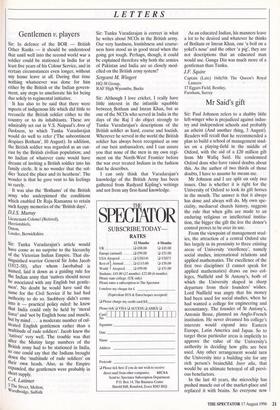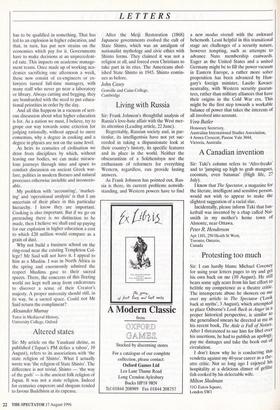Mr Said's gift
Sir: Paul Johnson refers to a shabby little left-winger who is prejudiced against indus- try and independent schools and probably an atheist (And another thing, 3 August). Readers will recall that he recommended a plan to build a school of management stud- ies on a playing-field in the middle of Oxford, with the aid of a £20 million gift from Mr Wafiq Said. He condemned Oxford dons who have raised doubts about this. As the author of two thirds of those doubts, I have to assume he means me.
Mr Johnson and I are split on only two issues. One is whether it is right for the University of Oxford to look its gift horses in the mouth. The answer is that it always has done and always will do. My own spe- ciality, mediaeval church history, suggests the rule that when gifts are made to an enduring religious or intellectual institu- tion, the bigger the gift the less the donor's control proves to be over its use.
From the viewpoint of management stud- ies, the attraction of a central Oxford site lies largely in its proximity to three existing areas of University 'excellence', namely social studies, international relations and applied mathematics. The excellence of the first two disciplines (I cannot speak for applied mathematics) draws on two col- leges, Nuffield and St Antony's, both of which the University shaped in sharp departure from their founders' wishes. Lord Nuffield was angry that his money had been used for social studies, when he had wanted a college for engineering and accountancy. The founder of St Antony's, Antonin Besse, planned an Anglo-French institution. He never dreamed his college's interests would expand into Eastern Europe, Latin America and Japan. So to target these particular areas is implicitly to approve the value of the University's authority in deciding how gifts are best used. Any other arrangement would turn the University into a building site for any rich person's brainchild. Inter alia, that would be an ultimate betrayal of all previ- ous benefactors.
In the last 40 years, the microchip has pushed muscle out of the market-place and replaced it with brains. So everyone now has to be qualified in something. That has led to an explosion in higher education, and that, in turn, has put new strains on the economies which pay for it. Governments have to make decisions at an unprecedent- ed rate. This impacts on academic manage- ment teams. Once made up of working aca- demics sacrificing one afternoon a week, these now consist of ex-engineers or ex- lawyers turned full-time managers, with many staff who never go near a laboratory or library. Always cutting and begging, they are bombarded with the need to put educa- tional priorities in order by the day.
And all this happens in a vacuum of seri- ous discussion about what higher education is for. As a nation we must, I believe, try to grope our way towards some criterion for judging rationally, without appeal to mere consensus, why a degree in cooking and a degree in physics are not on the same level.
As heirs to centuries of civilisation we draw from disciplines by which, without leaving our bodies, we can make miracu- lous journeys through time and space to conduct discussion on ancient Greek war- fare, politics in modern Borneo and natural processes otherwise invisible and inconceiv- able.
My problem with 'accounting', 'market- ing' and 'operational analysis' is that I am uncertain of their place in this particular hierarchy. I know they are important. Cooking is also important. But if we go on pretending there is no distinction to be made, then I believe we shall end up paying for our explosion in higher education a cost to which £20 million would compare as a grain of dust.
Why not build a business school on the ring-road near the existing Templeton Col- lege? Mr Said will not have it. 1 appeal to him as a Muslim. I was in North Africa in the spring and enormously admired the respect Muslims gave to their sacred spaces. There, the concerns of this fleeting world are kept well away from endeavours to discover a sense of their Creator's majesty. A proper university should still, in its way, be a sacred space. Could not Mr Said return the compliment?
Alexander Murray
Tutor in Mediaeval History, University College, Oxford



















































 Previous page
Previous page